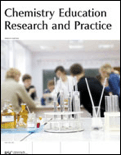
Chemistry Education Research and Practice
Scope & Guideline
Pioneering New Frontiers in Chemistry Learning Experiences
Introduction
Aims and Scopes
- Empirical Research in Chemistry Education:
The journal publishes rigorous empirical studies that investigate teaching and learning processes in chemistry, aiming to improve educational practices based on solid evidence. - Innovative Pedagogical Approaches:
It emphasizes the development and evaluation of new teaching methodologies, such as inquiry-based learning, flipped classrooms, and technology integration, to enhance student engagement and understanding. - Focus on Inclusivity and Equity:
The journal highlights research addressing diverse learner needs, aiming to create inclusive environments that support all students, particularly those from underrepresented backgrounds. - Assessment and Evaluation Practices:
It explores various assessment strategies, including formative assessments, to understand their impact on student learning and to improve educational outcomes in chemistry. - Cognitive and Metacognitive Strategies:
Research on cognitive and metacognitive processes is emphasized, focusing on how these strategies can be taught and applied to improve problem-solving and critical thinking skills in chemistry. - Interdisciplinary Connections:
The journal encourages research that connects chemistry education with other disciplines, promoting a holistic understanding of scientific principles and their applications.
Trending and Emerging
- Technology Integration in Chemistry Education:
There is an increasing focus on how technology, including mobile apps, simulations, and augmented reality, can enhance chemistry teaching and learning experiences. - Metacognitive and Cognitive Strategies:
Recent publications emphasize the role of metacognition and cognitive engagement in learning chemistry, highlighting strategies that foster deeper understanding and self-regulation among students. - Inclusivity and Diversity in Chemistry Education:
Emerging themes include research on inclusivity and diversity, focusing on how to create equitable learning environments for all students, particularly marginalized groups. - Inquiry-Based and Active Learning Approaches:
The journal is increasingly publishing studies that advocate for inquiry-based and active learning strategies, reflecting a shift towards more hands-on, student-centered educational practices. - Research on Student Identity and Experience:
There is a growing interest in understanding the experiences of different student populations in chemistry education, including identity, motivation, and engagement, which informs teaching practices. - Evidence-Based Teaching Practices:
The trend towards employing evidence-based teaching practices is on the rise, with research focusing on how these approaches can be effectively implemented in the chemistry classroom.
Declining or Waning
- Traditional Lecture-Based Instruction:
There has been a noticeable decrease in papers advocating for traditional lecture-based approaches, as the focus has shifted towards more interactive and student-centered learning methodologies. - Basic Chemistry Content Knowledge:
Research centered on basic content knowledge without a pedagogical focus appears to be declining, indicating a trend towards integrating teaching strategies with content understanding. - Generic Assessment Techniques:
The journal has seen fewer studies on generic assessment methods, with a growing emphasis on innovative, context-specific assessments that align with modern educational practices. - Disciplinary Silos in Chemistry Education:
There is a decreasing trend in research that focuses solely on chemistry as an isolated discipline, as interdisciplinary approaches become more favored. - Static Learning Environments:
Research focusing on static or traditional learning environments is less frequent, reflecting a shift towards exploring dynamic, technology-enhanced, and flexible learning contexts.
Similar Journals
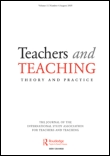
Teachers and Teaching
Advancing Educational Practices for Tomorrow's LeadersTeachers and Teaching is a premier scholarly journal published by Routledge Journals, Taylor & Francis Ltd, providing an essential platform for researchers, educators, and practitioners in the fields of Education and Arts and Humanities. With an editorial focus on the dynamics of teaching and learning, the journal aims to share innovative research and insightful discussions that enhance pedagogical practices and policy development. Notably, it has achieved a Q1 ranking in both the Arts and Humanities and Education categories, signifying its impact and relevance in educational research, as reflected in its Scopus rankings, with an 84th percentile for Arts and Humanities and a 76th percentile in Education. Although it does not offer open access, the journal provides extensive access options for libraries and institutions, making its rich content available to a wide audience. Spanning from 1995 to 2024, Teachers and Teaching continues to set the standard for high-quality scholarship in the evolving landscape of education, inviting contributions that explore challenges and innovations in teaching methodologies.

JOURNAL OF FURTHER AND HIGHER EDUCATION
Catalyzing Change in Educational PracticesJournal of Further and Higher Education, published by Routledge Journals, Taylor & Francis Ltd, stands as a prominent platform in the field of education, with a distinguished focus on further and higher education studies. With an ISSN of 0309-877X and E-ISSN of 1469-9486, this journal has been contributing invaluable insights since its inception in 1977. The journal boasts a remarkable Q1 ranking in its category for 2023, placing it in the top tier of educational research, underscored by its 83rd percentile ranking among Scopus Ranks in Social Sciences - Education. Researchers and practitioners alike are encouraged to submit their work, as the journal aims to foster innovative discussions and disseminate high-quality scholarly articles that address contemporary challenges in further and higher education. With its commitment to academic excellence, Journal of Further and Higher Education plays a crucial role in shaping policy and practice in the educational landscape, ensuring that the voices of educators and learners are heard and valued.
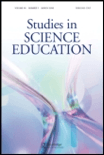
Studies in Science Education
Fostering Insightful Discussions in Science LearningStudies in Science Education is a prestigious journal published by ROUTLEDGE JOURNALS, TAYLOR & FRANCIS LTD, renowned for its commitment to advancing the field of science education. With an impressive impact factor, and categorized in the Q1 quartile within the Education domain, this journal ranks among the top in the field, currently holding the 16th position out of 1543 social science education journals, placing it in the 98th percentile according to Scopus rankings. Since its inception in 1974, it has provided a rigorous platform for researchers, practitioners, and educators to explore, debate, and disseminate significant findings relevant to science education. Although the journal does not offer open access options, it ensures high visibility through its well-curated content, including empirical studies, theoretical discussions, and innovative practices aimed at enhancing educational outcomes in science. By continuously engaging with contemporary educational challenges, Studies in Science Education serves as an essential resource for those dedicated to improving science teaching and learning worldwide.

STUDIA MATHEMATICA
Illuminating the Landscape of Contemporary MathematicsSTUDIA MATHEMATICA is a distinguished journal published by the Polish Academy of Sciences Institute of Mathematics - IMPAN, dedicated to advancing the field of mathematics since its inception. With an ISSN of 0039-3223 and an E-ISSN of 1730-6337, this journal serves as a significant forum for mathematicians worldwide to disseminate innovative research and theoretical advancements. Operating under a stringent peer-review process, STUDIA MATHEMATICA boasts a commendable impact factor that places it in the Q2 category within the mathematics discipline, indicating its critical role in the academic community. Covering a broad spectrum of mathematical topics, the journal aims to encourage interdisciplinary collaboration and foster a deeper understanding of both applied and theoretical aspects of mathematics. Researchers, professionals, and students alike will find a wealth of knowledge in its pages, contributing to the development of the mathematics field from its base in Warsaw, Poland. As it converges various strands of mathematical thought from 1996 to 2024, STUDIA MATHEMATICA continues to uphold its reputation as an essential resource for contemporary mathematical scholarship.
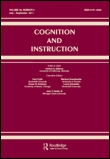
COGNITION AND INSTRUCTION
Unveiling the science of learning for educational excellence.COGNITION AND INSTRUCTION is a premier scholarly journal dedicated to advancing the understanding of cognitive processes in educational contexts. Published by Routledge Journals, Taylor & Francis Ltd, this journal plays a pivotal role in the fields of psychology and education, boasting a significant impact factor and ranking in the top quartile (Q1) across various psychological and educational categories, including Applied Psychology and Developmental and Educational Psychology. With a publication history stretching from 1984 to 2024, the journal serves as a critical resource for researchers, educators, and practitioners seeking to bridge theory and practice in teaching and learning. It provides a platform for high-quality research, focusing on the interplay between cognition and instructional practices, thereby fostering innovation in educational methodologies. Although currently not an Open Access journal, COGNITION AND INSTRUCTION ensures that cutting-edge findings and discussions are readily accessible to the global academic community, enhancing knowledge sharing and collaboration among scholars.
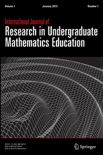
International Journal of Research in Undergraduate Mathematics Education
Empowering Educators with Cutting-Edge ResearchInternational Journal of Research in Undergraduate Mathematics Education is a premier peer-reviewed journal published by Springer International Publishing AG, dedicated to the advancement of research and scholarship in the field of undergraduate mathematics education. With an ISSN of 2198-9745 and an E-ISSN of 2198-9753, this journal serves as a crucial platform for educators, researchers, and policymakers to disseminate innovative findings and pedagogical strategies that enhance mathematical understanding among undergraduates. Positioned in the esteemed Q2 ranking in both the Education and Mathematics (miscellaneous) categories for 2023, it boasts a respectable Scopus ranking—17th out of 90 in Mathematics and 578th out of 1543 in Social Sciences (Education), placing it in the top percentiles of both fields. The open access format ensures that research is widely accessible, fostering collaboration and knowledge-sharing across the global academic community. Since its inception in 2016, the journal has been committed to publishing high-quality research addressing various dimensions of mathematics education, making it an essential resource for those engaged in enhancing educational practices and outcomes.
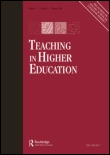
TEACHING IN HIGHER EDUCATION
Exploring transformative practices in university teaching.TEACHING IN HIGHER EDUCATION is a premier academic journal published by Routledge Journals, Taylor & Francis Ltd, dedicated to advancing the scholarship and practice of teaching within the higher education sector. With an ISSN of 1356-2517 and an E-ISSN of 1470-1294, this journal is widely recognized for its profound impact in the field, boasting a 2023 category rank of Q1 in Education, placing it in the top tier of educational research. Its commitment to fostering an inclusive and dynamic discourse on pedagogical methods and learning frameworks makes it essential reading for researchers, educators, and policymakers alike. Spanning topics such as student engagement, curriculum development, and innovative teaching strategies, TEACHING IN HIGHER EDUCATION aims to contribute to ongoing conversations and practical applications that enhance the educational landscape. While an Open Access option is not available, the journal maintains a robust readership, with its articles being rigorously peer-reviewed and disseminated to reflect cutting-edge research trends and practices in education.

Journal of Baltic Science Education
Exploring New Frontiers in Science Teaching MethodologiesThe Journal of Baltic Science Education, with ISSN 1648-3898, is a leading academic journal published by the SCI METHODICAL CENTRE - SCI EDUCOLOGICA in Lithuania. This esteemed journal, established in 2008, has gained recognition within the educational sector, boasting a notable impact factor that places it in the Q2 category for the year 2023, highlighting its significance in advancing educational research. With Scopus rankings reflecting a commendable placement at #659 out of 1543 in the Education category, the journal serves as a vital platform for disseminating knowledge and fostering discourse among researchers, professionals, and students in the field of science education across the Baltic region and beyond. The journal’s objectives include promoting innovative educational practices, sharing empirical research findings, and contributing to the development of effective science teaching methodologies, ensuring that it remains at the forefront of academic inquiry in education.

Teaching Statistics
Transforming Teaching Methodologies in Statistics.Teaching Statistics is a peer-reviewed journal published by Wiley, dedicated to the advancement of statistical education and pedagogical methodologies. With its ISSN 0141-982X and E-ISSN 1467-9639, this esteemed journal has been an integral resource since its inception in 1979, providing a platform for innovative research and practices aimed at enhancing teaching effectiveness in statistics across various educational levels. Housed in the United States, it maintains a significant global presence and engagement, evidenced by its Q3 quartile rankings in both the Education and Statistics and Probability categories as of 2023. Furthermore, it holds commendable Scopus rankings, reflecting its influence in the fields of Mathematics and Social Sciences. Although not an Open Access journal, it fosters a wealth of knowledge beneficial to researchers, educators, and students alike, striving to elevate the standards of statistics education through comprehensive discussions and analyses. Through its commitment to the dissemination of valuable insights and resources, Teaching Statistics continues to be a vital asset for academic and professional communities seeking to enhance statistical learning and teaching methodologies.
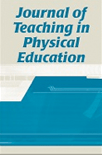
JOURNAL OF TEACHING IN PHYSICAL EDUCATION
Championing Health and Fitness in Education.JOURNAL OF TEACHING IN PHYSICAL EDUCATION, published by Human Kinetics Publishers Inc, stands as a premier academic journal committed to advancing knowledge and practice in the realms of physical education and related fields. With an impressive impact factor reflecting its relevance and influence in educational research, this journal boasts a distinguished classification as a Q1 journal in Education and Physical Therapy fields for 2023. Spanning from 1996 to 2024, it offers insightful contributions that engage educators, researchers, and students alike, addressing the evolving landscape of teaching methodologies and their implications for student health and fitness. The journal is accessible via traditional subscription models, providing a platform for innovative studies that aim to enhance teaching effectiveness and athletic performance. With a firm focus on interdisciplinary approaches, it plays a pivotal role in shaping future curricula in physical education and sports medicine.